Dietary Supplements Can Be Bad!4 min read


Phillip Chang, MD
Board Certified By The American Board of Plastic Surgeons.
Voted Top Plastic Surgeon in Loudoun, Virginia
Offices in Leesburg, Virginia.



Don’t get us wrong – some dietary supplements can be beneficial to health and improve our vitamin, mineral, and botanical intake. If we’re not eating enough nutrient-rich food, supplements can certainly help boost our well-being. However, not all supplements are as wonderful as they may seem.
Some supplements are like wolves in sheep’s clothing: they prove to be more harmful than beneficial. This is because the FDA does not have any authority in monitoring, approving, or checking any dietary supplements. The companies, manufacturers, and supplement makers are responsible for themselves. Unfortunately, many supplement companies have taken advantage of this by cutting corners and lying in order to make a buck at the expense of your health.
Read below for 4 ways YOU can be more diligent about your dietary supplements!
1. Be Aware Of Health Claims
Dietary supplements can help us get those vital nutrients we need to keep our body going, help our immune systems grow stronger, or reduce the threat of certain diseases. However, supplements are not allowed to be marketed for the purpose of treating, preventing, curing, or diagnosing diseases. Take precaution around supplements that make claims such as “treats liver disease” or “lowers blood pressure” or “prevents cancer.” Most likely, these claims are completely unsubstantiated,
2. Natural ≠ Safe
Just because a supplement says it is 100% natural or made of 100% natural sources does not mean that it is safe. Many all-natural supplements can be dangerous to your health, especially if you’re taking medication in addition to supplements. For example, Vitamin K supplements can be detrimental if taken with certain blood thinners that keep blood from clotting. St. John’s Wort speeds up the breakdown of many drugs, making them significantly less effective. Antioxidant supplements can hinder cancer chemotherapy. Before adding supplements to your routine, ALWAYS check with your doctor first. Not only will your doctor be able to recommend the best supplement for your needs, but they will also be able to provide you trustworthy supplement source suggestions.
3. Always Double Check
If a supplement sounds too good to be true, it probably is. Be especially wary about supplements that claim to improve sexual function, weight loss, memory retention, or muscle building. A 2018 study conducted by JAMA Network Function and Harvard Health Publishing found that out of 800 supplements that boasted these claims, around 80% contained one pharmaceutical ingredient and 20% contained more than one pharmaceutical ingredient. Some even contained three or more pharmaceutical ingredients! This included erectile dysfunction drugs, prescriptions weight-loss medications, steroids, anti-inflammatory drugs, and antidepressants. Keep in mind that these supplements are A) supposed to be free of conventional drugs, and B) claimed to be free of conventional drugs. These supplements are especially dangerous because they can lead to the misuse, accidental overdose, and other complications.
In 2015, Walmart, GNC, and Target were busted for selling bogus herbal supplements. The Washington Post reported that these store-brand ginkgo biloba supplements were actually nothing more than powdered garlic, wheat, beans, radishes, carrots, household plants, and other unidentified plants. These so-called “supplements” were potentially dangerous since they contained allergens, despite claiming to be free of these ingredients.
The National Center for Complimentary and Integrative Health and the National Institute of Health are constantly updating their databases with the latest information about nutrients, vitamins, minerals, and other supplement-related areas. It’s a good idea to double check with these sort of scientific, noncommercial sites to make sure the supplement you’re taking is truly good for you.
4. Keep Your Doctor In The Loop
We said it once and we’ll say it again: ALWAYS talk to your doctor before adding supplements to your routine. If you don’t want to go in office, give them a call. Shoot them an email. Throw them a text. Just make certain you talk to your doctor, dietitian, or pharmacist about taking supplements. The FDA provides this form to help you and your doctor keep track of the medications and supplements you take. This will best ensure that you’re doing the most for your health while taking supplements that are genuinely beneficial.
The Bottom Line:
Supplements can be a great help to our nutrition and health. However, it’s important that we stay educated on what we’re taking, why we’re taking it, and what it’s doing lest we be fooled by nonsense supplements.
Want to hear more?
What You Get
Innovations in cosmetic surgery, coupons and specials and invitations to our free seminars
Sign Up For Our Newsletter
More Articles For You

When Do Boobs Stop Growing? Finding the Perfect Time for Breast Surgery
Ever wondered when your boobs finally decide to take a break from growing? Or you’re
Are Silicone Injections in Buttocks Safe?
In today’s world, where the aesthetic appeal of one’s body can often feel as though

Does a Mommy Makeover Include BBL?
Many women look forward to the blessings of motherhood. Having a child is a very

Male Plastic Surgery: Before and After
Women aren’t the only ones who want an aesthetically pleasing body. Men do too. And
